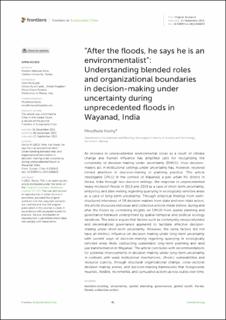| dc.contributor.author | Koshy, Mrudhula | |
| dc.date.accessioned | 2023-03-02T09:58:54Z | |
| dc.date.available | 2023-03-02T09:58:54Z | |
| dc.date.created | 2022-11-07T09:33:24Z | |
| dc.date.issued | 2022 | |
| dc.identifier.citation | Frontiers in Sustainable Cities. 2022, 4 . | en_US |
| dc.identifier.uri | https://hdl.handle.net/11250/3055238 | |
| dc.description.abstract | An increase in unprecedented environmental crises as a result of climate change and human influence has amplified calls for recognizing the complexity of decision-making under uncertainty (DMUU). How decision-makers act in institutional settings under uncertainty has, however, received limited attention in decision-making in planning practice. This article investigates DMUU in the context of Wayanad, a peri urban hill district in Kerala, India through two decision settings; the response to unprecedented heavy monsoon floods in 2018 and 2019 as a case of short-term uncertainty, and policy and plan making regarding quarrying in ecologically sensitive areas as a case of long-term uncertainty. Through empirical findings from semi-structured interviews of 58 decision-makers from state and non-state actors, the article discusses individual and collective actions made before, during and after the floods by combining insights on DMUU from spatial planning and governance literature underpinned by spatial-temporal and political ecology narratives. The article argues that factors such as community resourcefulness and decentralized governance appeared to facilitate effective decision-making under short-term uncertainty. However, the same factors did not have an intrinsic influence on decision-making under long-term uncertainty with current ways of decision-making regarding quarrying in ecologically sensitive areas likely obstructing sustainable long-term planning and land use transformation in Wayanad. The article concludes with recommendations for potential improvements in decision-making under long-term uncertainty in contexts with weak institutional mechanisms, chronic vulnerabilities and resource scarcity, through structural organizational change, cross-sectoral decision-making arenas, and decision-making frameworks that foregrounds heuristic, flexible, incremental, and cumulative actions across scales over time. | en_US |
| dc.language.iso | eng | en_US |
| dc.publisher | Frontiers | en_US |
| dc.rights | Navngivelse 4.0 Internasjonal | * |
| dc.rights.uri | http://creativecommons.org/licenses/by/4.0/deed.no | * |
| dc.title | “After the floods, he says he is an environmentalist”: Understanding blended roles and organizational boundaries in decision-making under uncertainty during unprecedented floods in Wayanad, India | en_US |
| dc.title.alternative | “After the floods, he says he is an environmentalist”: Understanding blended roles and organizational boundaries in decision-making under uncertainty during unprecedented floods in Wayanad, India | en_US |
| dc.type | Peer reviewed | en_US |
| dc.type | Journal article | en_US |
| dc.description.version | publishedVersion | en_US |
| dc.source.pagenumber | 0 | en_US |
| dc.source.volume | 4 | en_US |
| dc.source.journal | Frontiers in Sustainable Cities | en_US |
| dc.identifier.doi | 10.3389/frsc.2022.836843 | |
| dc.identifier.cristin | 2069736 | |
| cristin.ispublished | true | |
| cristin.fulltext | original | |
| cristin.qualitycode | 1 | |

